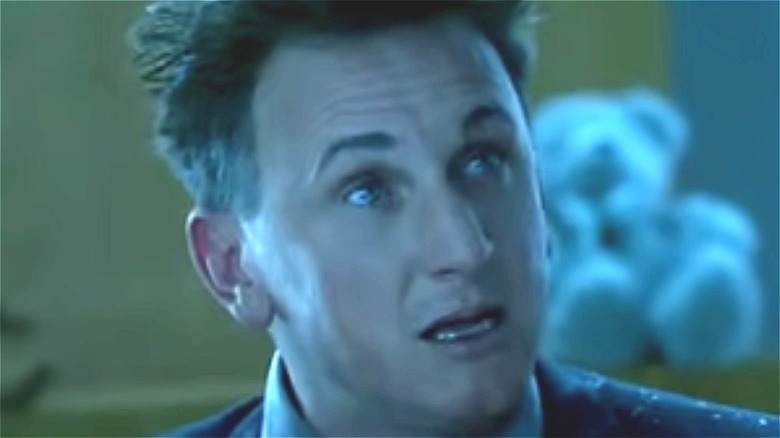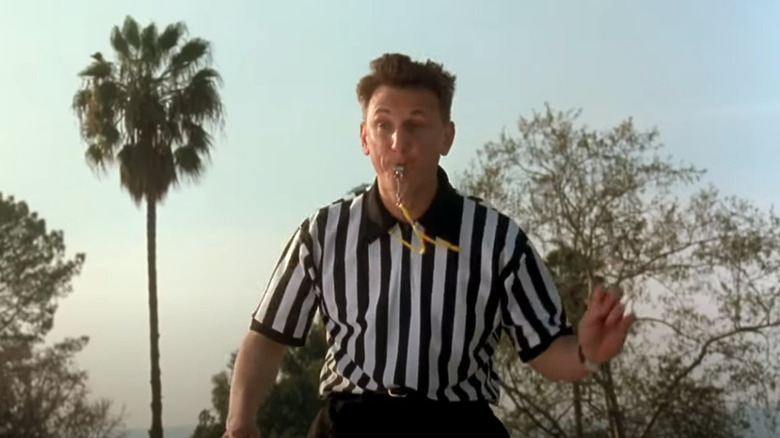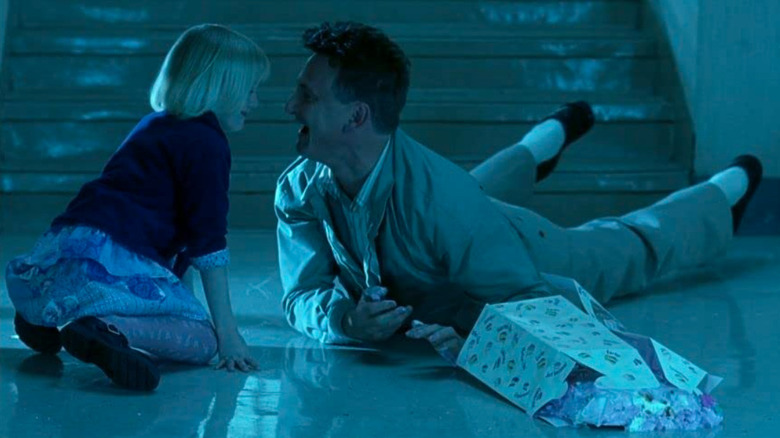The Ending Of I Am Sam Explained
"I Am Sam" tells the story of Sam Dawson (Sean Penn), a man with unspecified developmental disabilities who unexpectedly becomes the father of a baby girl, Lucy Diamond (Dakota Fanning). With help from his group of friends and acquaintances, Sam does his best to be a father for Lucy, but she eventually starts surpassing his mental abilities, which she tries to hide in fear of outgrowing her father. Soon, the authorities become interested of their family unit, and deem Sam unfit to be a father ... which Sam fights in court, aided by lawyer Rita Harrison (Michelle Pfeiffer).
Critics haven't been especially kind to "I Am Sam," and they've accused the movie of taking a complicated issue and simplifying it into an easily chewable Hollywood drama (via Rotten Tomatoes). Viewers, on the other hand, have largely enjoyed the film, which enjoys a very impressive 86 percent audience score on Rotten Tomatoes. Regardless of whether you're taken in by Penn's Oscar bait performance, or disagree with the way the film juxtaposes his act with some of the movie's other actors with actual disabilities, chances are that you have plenty of thoughts about the movie's ending. Let's take a closer look at the ending of "I Am Sam."
Ultimately, Sam wins the day
Though critics have been unkind to "I Am Sam," it's worth noting that the courtroom proceedings of the movie have caused Harvard Law School to arrange a screening of the film to discuss the child's best interests in such a case — as well as the various tactics the characters use to convince Sam's ability to function as a father. In The Washington Post, Special Olympics Chief Executive Officer Timothy Shriver also praised Sam's portrayal as someone who is able to enjoy life and fight what he recognizes as a clear injustice.
As movie plots go, "I Am Sam" ends in a somewhat predictable manner. Sam's displays of resourcefulness win the day, and when he convinces Lucy's would-be foster mother Randy (Laura Dern) that he's up to the task of parenting — and asks her to help with Lucy's upbringing — Randy decides to side with Sam, which ultimately convinces the court. As the movie makes abundantly clear, the cards are massively stacked against someone like Sam in a situation like this, so a happy ending like this might come across as a bit Hollywood-y. Still, when you remember that Harvard Law School and Shriver have deemed the movie's points worth discussion, is wrapping all these talking points up with a happy ending really a bad thing?
Growing up is a communal experience
Throughout the movie, a major counterpoint of the authorities' argument that Sam can't take care of a child is that he's not alone at it. The ending of "I Am Sam" highlights this by showing a soccer game where Lucy is playing and Sam is refereeing. In the stands, Sam's friend group — as well as Rita and her child — cheer on.
The implication here, of course, seems to be that of a "happily ever after" scenario, but it's worth noting that this is also a very handy moment for a movie to fade to black. Fast forward a few years, and Lucy is in her teens, which Sam and his tight-knit social circles — most of whom have some form of developmental disability or mental health issue — are likely unprepared to deal with. Even with the newfound help of Randy as a mother figure to Sam, one can't help but wonder how a sequel of the movie would pan out.
If you or someone you know is struggling with mental health, please contact the Crisis Text Line by texting HOME to 741741, call the National Alliance on Mental Illness helpline at 1-800-950-NAMI (6264), or visit the National Institute of Mental Health website.
Rita turns her life around
Apart from the main plot that deals with Sam's struggle to be a father to Lucy, "I Am Sam" also prominently focuses on Michelle Pfeiffer's hard-boiled Rita, who enters the scene as a cold, work-oriented person who's clearly estranged from her family, as well as the majority of life's good things. Sam's way to see the life in a very different way wins her over, and she starts representing him free of charge. Over the course of the movie, Sam's positive effect also helps Rita confront her own inadequacies as a parent, as well as her loveless marriage. In turn, she gets Sam through his worst moments after Lucy is taken away from him.
By the end of the movie, you see that Rita has clearly divorced her cheating husband, and regained her self-confidence in her personal life. What's more, she's last seen happily watching Lucy's football game with her son, which shows that she's grown to be a capable parent. As such, this monumental shift in her life means that she arguably goes through more character development than anyone else in the movie.



